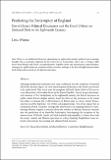Predicting the bankruptcy of England : David Hume’s political discourses and the Dutch debate on national debt in the eighteenth century
Abstract
Although intellectual historians have long established that the evolution of national debt had a decisive impact on early-modern political discourse, the Dutch case has yet to be understood. This article uses the reception of David Hume’s Political Discourses as an illustration of a broader debate in the Dutch Republic. Due to the peculiar financial situation of The Netherlands in the eighteenth century, the Dutch discourse on public credit did not display anxiety about the debts of the provinces or the union but rather scrutinised the creditworthiness of Britain and, to a lesser extent, France, and discussed the Republic’s role within a changing Europe. The article argues that an anonymous Dutch translator strategically intervened in an ongoing debate by transforming Hume’s original scepticism about the viability of Britain’s financial situation into the prediction of an inevitable bankruptcy. Investigating the reception of the famous essay ‘Of Public Credit’ in Dutch journals and pamphlets, it shows how both the essay’s content and Hume’s reputation as a deep-thinking ‘Englishman’ were utilised to disseminate the warning and address Dutch investors.
Citation
Weber , L 2017 , ' Predicting the bankruptcy of England : David Hume’s political discourses and the Dutch debate on national debt in the eighteenth century ' , Early Modern Low Countries , vol. 1 , no. 1 , pp. 135-155 . https://doi.org/10.18352/emlc.8
Publication
Early Modern Low Countries
Status
Peer reviewed
Type
Journal article
Collections
Items in the St Andrews Research Repository are protected by copyright, with all rights reserved, unless otherwise indicated.

